| |
|


FRIDAY, JULY 11 Ohr Shalom Zamru at the Bay


FRIDAY, JULY 18 Temple Solel Shabbat at Beach


SATURDAY, AUGUST 2 Temple Emanu-El Joshua Nelson Concert


MON., SEPT. 29-THURS., OCT. 9




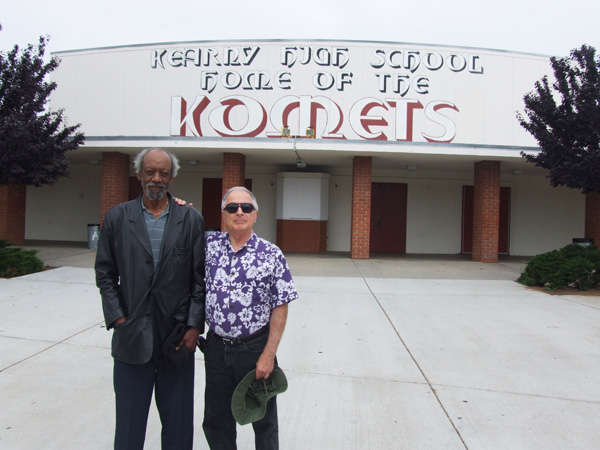
THE JEWISH CITIZEN
Danny and Clyde... They lived a lot, and stayed friends since their school days
By Donald H. Harrison
 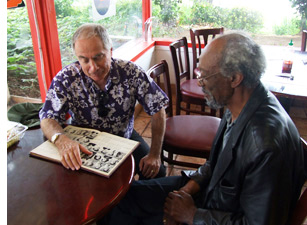 SAN DIEGO—Two graduates of Kearny Senior High School sat in a sandwich shop nearby and examined their high school year book, stopping occasionally to read an inscription, or to stare at a picture of a pretty girl. “I never got to….,” said one wistfully, as his friend laughed. “There were plenty of others, weren’t there?” SAN DIEGO—Two graduates of Kearny Senior High School sat in a sandwich shop nearby and examined their high school year book, stopping occasionally to read an inscription, or to stare at a picture of a pretty girl. “I never got to….,” said one wistfully, as his friend laughed. “There were plenty of others, weren’t there?”
It was a scene that might be repeated at high schools across the country, maybe even around the world. What made this one different was that these two friends had graduated from Kearny High School 54 years ago as members of its first graduating class on that campus. Having been friends for eight years prior to their graduation, the two old pals had 62 years of memories to share. Dan Schaffer and Clyde Thomas have stayed in touch all these years, and they try to have lunch together every two weeks or so. Dan invited me along on Wednesday, July 9, to meet Clyde.
Dan, white and Jewish, had moved with his family from Pensacola, Florida, to the Linda
Vista section of San Diego, where inexpensive housing had been thrown up to accommodate civilian defense workers who had poured into San Diego during and after World War II. Clyde, black and Christian, had moved with his family from Natchitoches, Louisiana, at the behest of an uncle, who moved out ahead of them.
In what Clyde described as a relationship similar to that portrayed by Morgan Freeman in the movie Driving Miss Daisy, the uncle had been a chauffeur for a Jewish family who had come to depend upon him. When the family decided to move to San Diego, they asked Clyde’s uncle to please come out with them. The uncle agreed, urging his sister—Clyde’s mother—and her husband to pack up their family and head for California too.
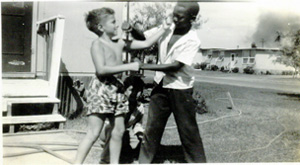 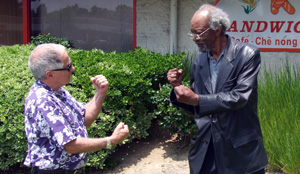
The Schaffers and the Thomases moved to homes on the same block, and whereas Southern racism might have precluded the boys from becoming friends either in Florida or in Louisiana, there were no such restraints in Linda Vista, which at the time seemed to them a small city on a hill, isolated from the cares and prejudices of the rest of the world. Here boys could be boys. Although Clyde was a head taller than Dan and far more athletic, both boys were quite smart and had a curiosity about the world. They had more qualities in common than differences.
After a while, Dan’s family moved to a house a few blocks away—putting him into a different elementary school. Nevertheless, they stayed in touch, Dan visiting Clyde’s home and vice versa. Once, after Clyde had visited the Schaffers, a neighbor woman from Texas came over to the Schaffer home and told Dan’s mother she didn’t much appreciate a black youngster coming to the neighborhood. Dan’s mother emphatically told the woman to mind her own business.
What impressed Dan about the incident was that his mother never made a big deal about how virtuous she was, or how she had stood up for civil rights, or said much else about it. Clyde and Dan were friends, and who did that neighbor think she was anyway? That was all there was to it.
The friends were reunited in high school, where both were honor students. Dan said Clyde became his “protector,” calling to mind the movie My Bodyguard. Shorter than most students, Dan could have been an easy target, but Clyde passed the word around the school that “Danny,” as he was called then, was an old friend of his, and if anyone messed with Danny they’d have to mess with him too. That settled the matter.
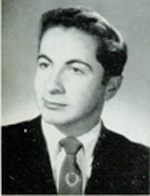 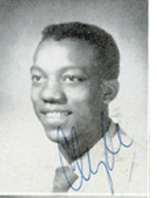 In their 1954 Komet yearbook, it says “'Successful’ Danny Schaffer was President of the Junior Co-ordinating Council, CSF, and CASC and belonged to Hi-Y, Senior Council, and French Club.” He was a campus politician in other words. “'Likeable’ Clyde Thomas,” according to the year book, “was kept busy with football, baseball, Spanish Club, Varsity Club, choir and Bible Club.” He was a well-rounded student, and one who “got straight A’s,” he recalled 54 years later. In their 1954 Komet yearbook, it says “'Successful’ Danny Schaffer was President of the Junior Co-ordinating Council, CSF, and CASC and belonged to Hi-Y, Senior Council, and French Club.” He was a campus politician in other words. “'Likeable’ Clyde Thomas,” according to the year book, “was kept busy with football, baseball, Spanish Club, Varsity Club, choir and Bible Club.” He was a well-rounded student, and one who “got straight A’s,” he recalled 54 years later.
Their paths separated after high school—Dan went to Harvard University and onto Stanford Law—and then decided that teaching, rather than practicing law, was what he really wanted to do with his life. After Dan taught school in Nigeria for two years, Clyde had him come to his chapter of the Congress of Racial Equality (CORE) to describe his experiences. Dan spent most of his life as a high school history teacher, and his wife Jane is a teacher too—in fact is still a teacher of teachers. Their daughter Sarah has followed her parents into a career as an educator.
Clyde went to San Diego State University and eventually went to work in the Los Angeles area for North American Rockwell, a position that led to his being an instructor to the NASA astronauts in the operation of the equipment aboard the rocket that would carry them through space. He recalled a time when he was standing in a classroom, not saying anything, when the astronauts came in. “Where’s the instructor?” one of them asked. “I am the instructor,” he replied to their astonishment.
After the course had progressed some sessions, he recalled, he was driving on the road when a car came up behind him, honking, then touching his bumper, falling back, honking, and touching his bumper again. Then the car pulled out, alongside him, and the astronauts riding inside cheerfully flipped him the finger. Clyde smiled as he told the story; the obscene gesture meant that the astronauts finally had accepted him.
Eventually, Thomas married and divorced and started a small company of his own—one that specialized in the exacting task of applying heat-resistant tiles to the spacecraft. Other aspects of his company had him calling on clients around the world—and among his treasures is a scrapbook filled with photos of himself in the company of one beautiful woman or another visiting various world heritage sites.
Clyde returned to San Diego approximately two years ago to retire. The friends who had telephoned each other every couple of months over four decades naturally started getting together again to relive old memories, and to build new ones.
K Sandwiches next to Kearny Senior High School, where Dan and Clyde sat and reminisced, has signs in Vietnamese, reflecting the heritage of its owners. As summer school students of many ethnicities came into the restaurant, ordered sandwiches, and sat at tables or took their food out, I couldn’t help but wonder if these students too would be privileged to enjoy decades-long friendships like that of Clyde and Dan.



TORAH ON ONE FOOT
We can judge a leader by his followers
By Rabbi Leonard Rosenthal
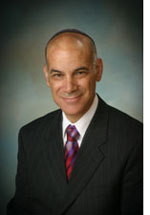 SAN DIEGO—Is it ever possible to judge the character of another human being? We only see the surface. God, alone, looks into the heart. SAN DIEGO—Is it ever possible to judge the character of another human being? We only see the surface. God, alone, looks into the heart.
Balak, the king of Moab, wanted the prophet Bilaam to curse the Israelites. Although Bilaam protested that he could only speak as God commanded the Rabbis doubted his integrity.
The Rabbis taught in the Mishna: "Abraham’s students possessed three virtuous qualities while Bilaam’s students possessed three contemptible ones. Abraham’s students had good eyes, modest spirits, and humble souls. Bilaam’s students had evil eyes, haughty spirits, and arrogant souls."
Rabbi Meir Blumenfeld noted that the Mishna did not distinguish between Abraham and Bilaam, but rather between their students. There was good reason for the Mishna doing so.
Rabbi Blumenfeld said that evil people often have the uncanny ability to put up a good front. They say things and act as though they are righteous people. They can even make a sincere and convincing argument to make a pig’s foot kosher! People are often fooled into believing and following them because they can only see what is on the surface. Only God knows what lies beneath.
Bilaam was this type of evil doer, said the Rabbis. Although his words reflected a righteous nature ("I can only do what God says") in his heart he was filled with hatred and arrogance and wanted Israel to suffer. But how were the Israelites to know?
Rabbi Blumenfeld says that the best way for us to recognize a leader’s or teacher’s qualities, given than we cannot look into their hearts and souls, is for us to observe their followers’ words and actions. In the Mishna we learn about Bilaam from his students: they were evil, haughty, and arrogant. Although Bilaam was able to disguise his true nature, they were not. Conversely, the students of Abraham were virtuous, humble, and modest, the same as him. From their students we learn about the teachers. (Min Ha-Torah).
It is the same today. To have insight into our leaders’ and teachers’ inner character we have to observe how they inspire their students and followers. As Walter Lippmann once wrote, "The final test of a leader is that he leaves behind him in other men the conviction and the will to carry on."


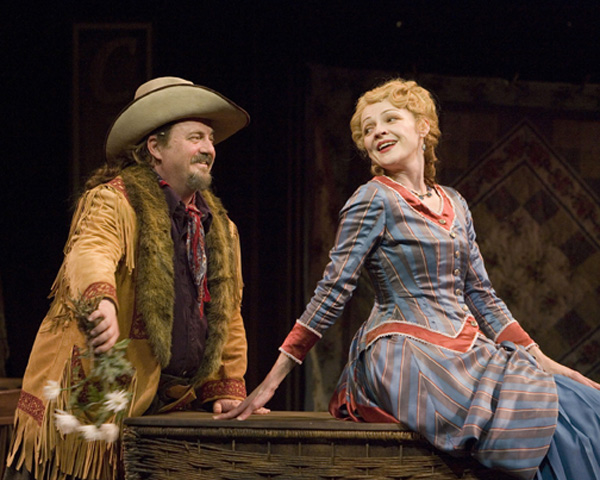
ARTS IN REVIEW
Falstaff a great fall guy in 'Merry Wives'
By Carol Davis
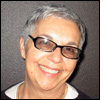 SAN DIEGO—Rounding out this year’s Shakespeare festival Merry Wives of Windsor takes front and center stage in rotation with All’s Well That Ends Well and Romeo and Juliet. This is the fun show, the slapstick, the merriment and the best of the lot if you’re looking for Shakespeare lite, even though it’s not one of Shakespeare’s finest hours. SAN DIEGO—Rounding out this year’s Shakespeare festival Merry Wives of Windsor takes front and center stage in rotation with All’s Well That Ends Well and Romeo and Juliet. This is the fun show, the slapstick, the merriment and the best of the lot if you’re looking for Shakespeare lite, even though it’s not one of Shakespeare’s finest hours.
Set against an Old Western (think saloon) background with pretty authentic looking western garb (tongue in cheek especially on the men) (Ralph Funicello, set and Denitsa Bliznakova, costumes) director Paul Mullins pulls out all the stops to make this rather less attractive romp funnier than it really is. According to a tradition and first recorded by John Dennis in 1702, the play was personally commissioned by Queen Elizabeth, who wished (in 1709) to see Falstaff in love. So reports the Oxford Companion to Shakespeare.
It’s another one of those convoluted ‘who killed John’ stories but it is packed with fun and merrymaking at John Falstaff’s expense. Eric Hoffmann plays the rotund rascal with a gleam in his eye and glance over his shoulders to perfection. Mullins' choice location of the Wooly West crammed with pistol packin’ papas of no accord is a perfect setting for the fine cast of characters in this farcical caper.
In recapping the story, the rogue Sir John is smitten with both Mistress Ford (Kate McNichol) and Mistress Page (Celeste Ciulla) after meeting them at a dinner party. In an effort to win their affection, sexual favors and fortunes (both women are in charge of their families purse strings and both are married to Noblemen) he sends letters expressing his love to each of the women writing exactly the same message in each note.
Good news for those who thought Shakespeare might have been a little prejudiced toward women (yours truly included especially when I think of his Taming of the Shrew) by not exactly putting them in a good light. These two are more clever than most. Together they figure out his ruse and turn the tables on him.
Unfortunately, their respective husbands catch wind of their plot to ensnare Falstaff and one, Frank Ford (Bruce Turk is at his best here as both husband and in his disguise as Brooke) is extremely jealous. While the women seek to get revenge on Falstaff, Ford is on his own to catch the rogue in another scheme masquerading as Brooke in some of the funniest exchanges in the play. It’s all so slapstick and elaborate fun and games that sitting back and enjoying it is the order of the night. We’ll just give credit where credit is due and like it for what it is, pardners.
Since the plot, and dig deep on this one, is all about whose guise will win out and how, each little subplot bobs and weaves an interesting path throughout and no one is the wiser, especially Falstaff. So why not go for the disguises, exaggerated accents and out of this world monkey business? And while we’re at it let’s throw a little barroom music with piano, harmonica and fiddle into the mix and a can can or two for good measure. (Wesley Fata) It’s all in good jest and the time passes very quickly.
One of the funniest characters besides Falstaff is Jonathan McMurty’s Robert Shallow, a justice of the peace (gornisht helfn). He’s the slowest gun in the West and the most dangerous for his lack of accuracy. Dressed like Wild Bill Hickok, he snarls, scares himself to death when he draws his guns and is great window dressing every time he’s on stage. McMurtry, who just turned 71 this year, is an Old Globe staple having appeared in at least 200 productions since 1961. He is in all three of this year's shows. Hats off to him.
Another plum of a role is Wynn Harmon, the Frenchman Dr. Caius with an accent as thick as Hollandaise sauce and as comical looking as a Barker in a circus. He’s vying for the hand of Anne Page, (Carolyn Ratteray) Mistress Page’s daughter who is promised to Slender (Shallow's nephew) a nebbish by every stretch of the imagination played beautifully by Sloane Grenz. Shallow's servant is called Simple and is played with a twinkle by Brian Lee Huynh.
One of Falstaff’s friends, Pistol (you can see how much fun Shakespeare is having with the take offs on these names that makes a western setting just right) John Keabler saunters onto the stage with chaps and spurs in defense of his pal. Both he and Sam Henderson as Nym, another Falstaff follower, play the banjo and harmonica while Celeste Ciulla plays the fiddle in a few of the barroom scenes. Michael Kirby as Bardolph, who acts as bartender at the Garter Inn, was on what looked like the player piano.
When all is said and done Anne Page gets the guy she wants, mistresses are reunited with their husbands, some lessons are learned (very few I’m afraid) and in a show of good will, Falstaff is invited to Anne’s wedding to Fenton (Owiso Odera). In the words of the Bard “All’s Well That Ends Well”.
Now we’ve come full circle. The plays are there for you see either all or some. As mentioned earlier, they are in repertory on the Lowell Davies Festival Stage outdoors through Sept. 27.
See you at the theatre.
As a footnote: James Shapiro’s Shakespeare and the Jews is a wonderful reference book that talks about the world in which Shakespeare lived that included the Elizabethan anti-Semitism that allowed the ideas and attitudes for Shakespeare’s Merchant of Venice to surface.
In his introduction the author writes, “The book is concerned with what Shakespeare and his contemporaries thought about the Jews. While there were not many Jews in early modern England, it was nonetheless a society surprisingly preoccupied with Jewish question.”
Darko Tresnjak who studied it before directing Merchant in New York recommended the book to me. It’s a good one to have as a reference in your library.

JEWISH MEMORIES
Famed director Sydney Pollack laughingly agreed to take direction from an amateur
By George Falkowitz
OCEANSIDE, California—In 1992 my wife Mona and I were vacationing on Grand Cayman Island in the Caribbean. We were enjoying an afternoon of reading on the beach near our hotel. When an air show put on by American Airlines and Cayman Airways started its fly-over, we joined a group of onlookers standing near us to watch the low-flying aircraft. The man standing next to me seemed especially knowledgeable about airplanes and flying.
I was holding a paperback copy of The Firm by John Grisham, a thriller that, coincidentally, takes place partly in the Cayman Islands. The man noticed the novel and asked, “How do you like the book?” I replied that I was only halfway through but I was enjoying it. Then, strangely, I thought, he said, “The ending should be changed.”
At this curious remark, I took full notice of the man and realized that I was talking to Sydney Pollack, the renowned movie director and sometime actor whose face I recognized. It was then I heard that Pollack and his colleagues were on the island scouting movie locations that would be used in the film based on the book. “Who’s playing the lead?” I asked, referring to the attorney who gets involved unwittingly with organized crime. “Tom Cruise,” Pollack answered. “Who’s playing his wife?” I asked again. “We haven’t chosen her yet,” he replied. At that point I recommended, brazenly, my niece who is an actress. Pollack smiled but was politely noncommittal.
We chatted with him and the film’s executive producer Michael Hausman about sundry matters. Their warmth and friendliness gave me the courage to ask Sydney Pollack if he would allow me to film him and Mona with my camcorder in an improvised beach scene. To my surprise and joy, he readily and graciously consented. Suddenly, I was making my directorial debut with a brief, impromptu scene starring Oscar-winning director Sydney Pollack and my wife Mona Miller.
Never in my imagination could I have conjured up the thought that I would be giving acting instructions to the man who directed Robert Redford, Barbra Streisand, Dustin Hoffman, Meryl Streep, Tom Cruise and Nicole Kidman to name a few. “Cut,” I finally said. Mona interrupted. “That’s Mr. Pollack’s job,” she exclaimed. “Cut and print,” Pollack added. Hausman, observing the filming, cautioned jokingly that any public showing of the film would require payment of residuals.
Later, Pollack inscribed my copy of the Grisham novel. It reads: “To Mona and George. Hope to see you again in the Caymans. All best. Sydney Pollack.” When the movie was released in 1993 to great acclaim, we went to see it and marveled at locations we recognized. But later that year, there was a very sad ending to our memorable encounter with the popular filmmaker that had begun at an air show. It was when we learned from news reports that Pollack’s son had died in a plane crash.
Sydney Pollack’s death this last May 26 stunned us. But we will always have the pleasure of seeing him again in the Caymans whenever we watch our home movies.


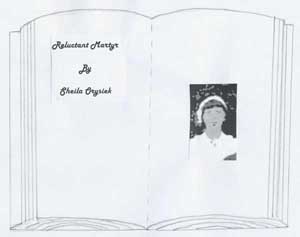 Editor's Note: This is the 16th chapter in our serialization of Reluctant Martyr, a historical novel by our columnist Sheila Orysiek. It is based on the experiences of her aunt. In each Friday-Saturday edition of San Diego Jewish World, we will run another installment of the 21-chapter book until its conclusion. We thank Sheila for granting us first publication rights to her book. Comments to the author are welcome at orysieks@sandiegojewishworld.com Editor's Note: This is the 16th chapter in our serialization of Reluctant Martyr, a historical novel by our columnist Sheila Orysiek. It is based on the experiences of her aunt. In each Friday-Saturday edition of San Diego Jewish World, we will run another installment of the 21-chapter book until its conclusion. We thank Sheila for granting us first publication rights to her book. Comments to the author are welcome at orysieks@sandiegojewishworld.com
Chapters 1 2 3 4 5 6 7 8 9 10 11 12 13 14 15 16 17 18 19 20 21
Reluctant Martyr—Chapter 16
It was at this time that some friends that Hannah and Jahn had met years before came forward and took it upon themselves to aid her. Oscar and May Overman had a large and beautiful home in Neshaminy, Pennsylvania. They were also immigrants from Russia and the husband had brought with him an old family recipe for pickling vegetables; a secret brine. With very little money and beginning in a cellar of an old house, he had built up a multimillion dollar business with processing plants and many workers.
May Overman came to State Street, prepared to ignore Hannah’s refusals, and take her to their house. “Hannah!” May called from the bottom of the stairs, “I’m coming up to see you!”
“She’s still in bed,” Sharona said from the kitchen, “go on up and surprise her.”
“How is she doing? Any better?”
“Not very much better,” Sharona shook her head, “she’s very depressed.”
“Does she have a suitcase?” May asked.
“Yes, I’ll ask Istvan to get it from the cellar,” Sharona said as she wiped her hands on her apron.
May climbed the steps and went into Hannah’s bedroom to find her in bed staring up at the ceiling. The shades were drawn and the room was drenched in gloom.
“May!” Hannah exclaimed in surprise. “What are you doing here?”
May walked directly to the front window and looked out. “First of all I’m going to let some sun in.”
“I don’t want any sun. Ever again.” Hannah drew the blankets up and closed her eyes.
May rolled up the shade and then began to tug on the bedcovers. “Come on now get up!”
“Why? Why should I get up? I have no reason....”
“Yes, you do. You’re going on a trip.”
“A trip? No!”
“Yes, a trip. I’m taking you to my house. The car is waiting around the corner. It wouldn’t fit on this street! Now get up and get dressed right now!”
“I don’t want to go. I won’t go.”
Istvan walked in with the suitcase and Sharona followed. “Well,” said May as she opened a drawer, “you’ll need some stockings and some...”
“What are you doing?” Hannah asked as she sat up.
“You’re going! Like it or not! If you won’t pack then I’ll do it for you. Now do you want me to dress you too? Are you going to come peacefully or not?”
“I’m coming.” Hannah slowly got up. “Mother help me. What should I do?”
“You should go.” Sharona replied very definitely.
Neshaminy was a particularly beautiful place; green beyond measure, the grass and trees rolled to the horizon. Narrow roads became narrow bridges that crossed countless small streams. One such country lane wound its way up to the Overman’s house that was set in a lush lawn and surrounded by a farm. A huge willow tree stood in front of the house, its fronds reached to the ground, circled about and provided a curtain of shade. Within this arbor were set comfortable chairs and reclining lounges.
Inside the house every comfort was evident. The rooms were tastefully decorated and the antiques and treasures of world travel stood about in testimony to the knowledge and curiosity of the owners. In the kitchen a white clad cook and a uniformed maid completed the picture. Most of all it was quiet, peaceful, beautiful and just what Hannah needed.
The Overmans, while sympathetic, did provide an atmosphere of normality. It was much more difficult to be wildly emotional and demanding with friends than with family and at that point in time Hannah needed the constraint. She was almost forced by simple courtesy to smile upon occasion and at least to pretend to listen to another’s conversation and even partake in it. And so, gradually, very gradually, it became a bit easier. At some point she realized that a smile or even a laugh did not lessen her loyalty to Jahn’s memory.
After a stay of two months in this house, Hannah returned to State Street better able to cope with the days before her. She did not remain home long, because while at the Overman’s, Hannah met another couple, Dr. Kenneth Miller and his wife, Ina, who were also to be her lifelong friends. He was a dentist with a most successful practice and they owned a colonial country house, the deed of which went back to 1750. The setting for this home, too, was singularly beautiful and Hannah’s visit there was a great help to her.
It was February when Hannah came back to State Street. Patches of ice were on the sidewalks and the city was firmly in winter’s grip. The gatherings around the supper table were subdued. Etah and Bernard were frequently there; Yarosh and his family less often. Toward the end of the month, Sofia delivered a second child, a boy, and the family took the El downtown to Pennsylvania Hospital where the birth had taken place. The new baby was big and healthy and the parents were justly proud of him. After seeing the infant through the nursery window the family went to visit the mother in her room. Sofia looked well, Yarosh beamed and congratulations were offered all around. Hannah went forward and kissed her brother.
“A healthy child, Yarosh, a moment to be proud!” she said. But, when she heard Sofia tell Istvan the baby’s name was to be Brian, her face froze and her throat contracted. It was the custom to name a child after a beloved, deceased member of the family and to Hannah there was only one such deserving person.
“Yarosh! Brian?” she cried. “But my Jahn...surely his name...”
Yarosh turned toward her and calmly said, “The name is already chosen, Hannah. It is for Sofia’s grandfather.”
Sofia was calm too, almost cool. “The child’s name is already chosen,” she repeated.
Hannah stumbled from the room, hot tears falling down her face. She had never once doubted, not even considered the possibility, that Jahn would not be honored. Her heart swelled and choked in her throat. The happiness of the moment had been shattered for everyone.
The new mother stayed for two weeks in the hospital and so little Sinda came to live for that time in the house on State Street. She slept on the sofa and chair backs were placed along its length to prevent her from falling off the edge. She was a delightful child, a perfect mass of feminine ribbons and bows. If Hannah found a lively child irritating before, she found it perfectly nerve wracking now. It fell to Sharona to care completely for Sinda in addition to the household chores. Hannah had never been one to participate in either activity.
In the past Hannah had developed the avoidance of helping in the house to artistic heights but was not entirely conscious of it. A backache or a headache would suddenly present itself at a propitious moment and she would have to lie down. Or, she would remember she needed to call a friend as she dusted the telephone. Whenever it fell to her lot to cook supper, she would repair to Mr. Becker’s store and buy sliced sandwich meat and so she never actually cooked anything. Now she used her grief as an excuse.
Early in March Etah and Bernard announced a child would be born to them in October. Etah had never been around a young child except for Sinda and she dearly loved the little girl. Whenever she had the opportunity she played with and amused her young niece endlessly. Paper dolls were a favorite pastime. Etah would sit by the hour and cut out the intricate dolls and clothes and then spend more hours making up stories with Sinda for the play family. She wanted very much to have a beautiful little girl just like her. As the months went by Etah had to quit her job at Uncle Joseph’s office since it was not considered seemly for a pregnant woman to work. He offered the job to Hannah but she still had some of the life insurance money left and saw no reason to accept employment.
It was a hot and heavy summer that year and the city wilted in the humid air. Children gathered around the open fire hydrant on the street corner and jumped through the spouting water. They moved quickly and could only stay where the pavement was wet to keep the soles of their feet from burning against the hot sidewalk. The brick houses retained the heat and became ovens both day and night. All over the city the scene was repeated, people lived out of doors in the evening and mosquitoes pursued a nightly feast. There were only a few hours of respite until the full force of the sun returned in the morning and another panting day would begin. But the work of the city had to go on, in hospitals, stores and factories; people labored through the heat and humidity.
In the middle of the summer Istvan decided to open a second tailor shop. The living he earned at the shop on 40th Street was barely sufficient to cover their needs. He could have accepted employment at a sewing factory, but wanted to try this first. He planned to spend half a day in each shop though it meant traveling back and forth a great deal. A tailor who had a store on South Street retired sold his equipment to Istvan for a fair price.
Early in October, Etah was taken to Hahnemann Hospital and after a long labor was delivered of a child, a girl. The baby was healthy and normal but somehow Etah was disappointed from the very beginning. It didn’t look at all like Sinda; the newborn was a bit wrinkly and flushed, not the peaches and cream that Sinda was.
The infant was named Sarah, after Sharona’s mother. On the first Friday that Etah was home from the hospital she and Bernard brought the baby for the Sabbath supper to State Street. Sharona already knew of the name choice but had not dared to tell Hannah. They all sat down around the table. The busyness of the work week was over and the quiet, happy peace of the Sabbath descended upon them. Friday night supper - Sabbath supper - was anticipated all week. The platters of food filled the table and the candles flickered a joyful glow, as they all started to eat. Hannah began to propose names. As she held the infant she said to Etah, “Janet would be a nice name for her and that’s pretty close to “Jahn.” What do you think? Or maybe Joyce? There are lots of pretty choices....”
Very quietly Etah told her, “The name is Sarah after our grandmother.”
Hannah’s entire body contracted, she thrust the baby back into its mother’s arms. “Sarah? Sarah? You never knew our grandmother! You’re naming her after someone you never knew?” She was enraged, her voice almost a scream. “How can you do that to me? After all I’ve done for you! You lived here....”
“Hannah, Jahn died so young,” Etah tried to explain. “He was so sick, I don’t...”
“...you lived here in this house! Jahn slaved all those years to feed you!
“....he was so sick, Hannah, please...”
Hannah did not hear; she couldn’t. She only knew that once again her beloved husband was being ignored; even dishonored. Her anger pounded in her ears and she could hear nothing else. “You ate his food and mine and now you dishonor his name? And you call yourself my sister?”
Sharona tried desperately to put her arms about Hannah; to stand between them. She was crying for both of her daughters. Bernard and Etah hurriedly put on their coats and went out the door. Hannah followed them and Sharona ran after her to put a coat about her shoulders, but she shook it off. Istvan held Sharona back. “You can’t help them,” he said. “Come inside.” The battle continued down the street.
“Hannah, go back you’ll get sick - it’s cold!” Bernard tried to take her home but she ignored him.
“This is my sister?” she screamed. “My dear sister who throws back in my face all I did for her?” She followed them across to Cambridge Street. People came to their doors but Hannah was oblivious.
“Hannah,” Etah cried, “you’re disturbing the whole street!”
“I spent all my youth...I saved your life...and you insult my husband so?” Then she stopped and stood still, “I beg you to change your mind. He was a good man.”
“I know he was, Hannah, and I loved him too.”
“Then I beg you for that love to bless his memory!”
“He was so sick, he died so suddenly, I don’t want my child...”
“Etah!!”
They were at the door of Etah’s house. “Come in, Hannah, you’ll get sick in the cold,” she pleaded.
“Etah, I’m asking you for the last time! Name the baby after Jahn. I beg you, Etah, I’ll never speak to you again!”
Etah was sobbing and through her sobs said, “The baby’s name is Sarah.”
Hannah turned on her heel and ran back toward State Street. “Hannah!” Etah called. But she ran on. She was crying hysterically when she got home and there was no comfort that either Sharona or Istvan could offer to alleviate the pain.
“My sister! My own sister!” she kept sobbing. The food remained half eaten on the plates. Sharona sat at the table heartbroken to see her two daughters hurt each other so; she felt torn between them, understanding and sympathizing with each. For the next three years Etah and Hannah did not speak to one another. Every Friday night, and often during the week, they shared the same table, accompanied their mother and avoided each others' eyes.


ADVENTURES IN SAN DIEGO JEWISH HISTORY
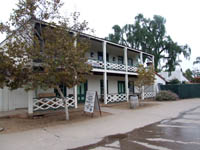
Robinson-Rose House
|
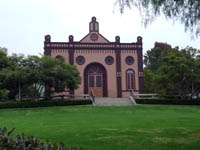
Old Temple Beth Israel |
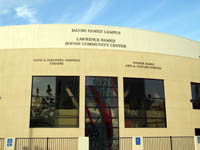
Lawrence Family JCC |
Editor's Note: We are reprinting news articles that appeared in back issues of various San Diego Jewish newspapers. You may access an index of the headlines of those articles by clicking here. You may also use the Google search program on our home page or on the headline index page to search for keywords or names.
J.C.R.A.
From Southwestern Jewish Press, July 10, 1947, page 6
Indoor Picnic! Cards! Bazaar! Complete Dinner! And lots of Fun! What more can one ask for a day of relaxation? It will all happened on Sunday, August 3rd at the Temple Center. “The public is cordially invited,” announced President Anna Shelley.
More than ever before is the Jewish Consumptive Relief Association calling upon the people of san Deigo to support this annual affair given for the Sanatorium at Duarte, a non-profit, non-sectarian institution, which is enlarging its facilities to accommodate 800 bed patients. Its capacity now is 250 beds. At the present time, only tuberculosis is treated at the Sanatorium. New buildings will include a Medical Center equipped to treat all the ailments of a patient thereby effecting a greater art of healing for those who are ill and unable to pay for needed hospitalization.
Birdie Stodel B.B.
From Southwestern Jewish Press, July 10, 1947, page 6
A non-profit luncheon, the quarterly birthday party, a very short business session and an interesting speaker in the person of Rabbi Baruch Stern who will have as his subject, “The Jewish Woman’s Place in Her Community,” will be the program set for Monday July 14th for Birdie Stodel B’nai B’rith No. 92 at the Temple Center beginning at 12 noon. President Esther Schwartz will preside.
Rumor has it that the luncheon and card party scheduled for Wednesday, July 16th at Noon will be at the chi-Chi Restaurant on Fourth Avenue. The proceeds from the luncheon will go completely to the “Orphans of the Storm” program of the B’nai B’rith and it is urged by chairman Martha Feiler and co-chairman Selma Lindenfeld that all members attend and bring guests. Reservations are necessary and are being taken at M-3022 and W-3852.
Much plotting and planning is being done by donor Luncheon chairman ruth Aronoff and her committee for the affair which will be held October 15th. The Donor Luncheon will be the kickoff for a very busy Fall Season for Birdie Stodel members.
USO-JWB Activities
From Southwestern Jewish Press, July 10, 1947, page 6
Esther Siegel, USO-JWB Director would like to emphasize that the USO-Jewish Welfare Board will conduct regular activities for servicemen.
Dances are held every Tuesday and Sunday nights at the Temple Center, 3rd and Laurel Streets. It is important that everyone in the community be aware of the program so that if a servicemen requests information about Jewish activities local residents will be able to give him the proper information. In addition to these dances, picnics are held every Sunday afternoon. The group which consists of servicemen and local girls leave the Temple Center at 12:00 (noon) for the beaches or one of the picnic areas. Transportation is furnished. Also the local JWB office, 573 Spreckels Building, is open every day including Saturday. On Thursday nights the office is open from 7:30 to 10:20 at which time the “Aleph-Nunn” Servicemen’s club meets.
If you will pass this information on to your friends, you will be rendering a great service to many boys in uniform who are strangers in the city looking for the Jewish Welfare Board or for Jewish activities. For further information call Franklin 8805.
Palomar Camp Plans Completed
From Southwestern Jewish Press, July 17, 1947, page 1
With the completion of five weeks of day Camp sponsored by the Community Center Committee of the United Jewish Fund, Camp Palomar for boys and girls between the ages of 7 and 15 will be operated for one week, from July 28 to August 3. Situated in Dome Valley at the crest of Mount Palomar, the camp is one of the show places of San Diego County. It is owned by the City-County Camp Commission. Its facilities are comparable to that of private camps.
The younger children will bunk in a new barracks building that has recently been completed, while the others will live in tent shacks which have flooring as well as side boards. The kitchen is considered one of the best camp kitchens in the San Diego area. Meals will be served in the mess hall. Staff will consist of the director of the camp and his two assistants, provided by the City-County Commission, and a cook. Also, two maintenance men. “The staff of the Community Center Committee will be headed by Al Hunter, Ben Haddock, head counselor of the Day Camp, Ed Breitbard, Stanford Brust, Herb Solomon and several others who will be selected in the near future.
Activities will consist of trail hikes, nature study, camp lore, athletics, games, folk dancing, movies, and a trip to points of interest such as the Palomar Observatory. The fee for the week will be $25 which includes transportation and all expenses. Registration will be taken on Monday, July 21, 9:30 a.m. at the Temple Center. “Camperships” will be available for any children who cannot afford the full price for the week. For any further information call Franklin 0171.
DEDICATIONS SOUGHT—Every one of these stories rescued from the yellowing and disintegrating archives of Southwestern Jewish Press are now permanently archived here on the website of San Diego Jewish World. In this way, we believe, we are making the history of our community accessible to researchers, and at the same time are preserving the memories of community members and organizations that came before us.
We urge our readers to consider dedicating an installment of "Adventures in San Diego Jewish History" to a family member or friend, living or dead, and thereby add their names to our archives. Dedications cost only $18 (Chai). Surprise someone on a birthday, or anniversary, or other special event with an online greeting, or mark a yahrzeit. Your instructions accompanied by your check (and telephone number in case we need clarification) may be sent to San Diego Jewish World, PO Box 19363, San Diego, CA 92159.

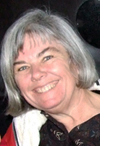 Nancy Harrison Nancy Harrison
cruise & tour specialist
(619) 265-0808

SAN DIEGO JEWISH WORLD THE WEEK IN REVIEW
Middle East
Negev mayors protest Olmert decision against fortifications along Gaza border by Ulla Hadar in Sderot, Israel
U.S.-Iraq withdrawal negotiations prompt posturing for both countries' electorates by Shoshana Bryen in Washington D.C.
San Diego
San Diego had his dream job and great weather, but Israel had his heart by Donald H. Harrison in San Diego
San Diego Jewish Trivia: Places by Evelyn Kooperman in San Diego
Adventures in San Diego Jewish History
—July 10, 1947: Fund Total Must Be Raised
—July 10, 1947: Registration Opened for Camp Palomar
—July 10, 1947: 'Campers' to Visit Training Center
—July 10, 1947: Lasker Lodge B.B.
Arts
Globe's Romeo and Juliet needs polish by Carol Davis in San Diego
Thursdays with the Songs of Hal Wingard of San Diego
—#51, Waiting for Anne Marie
—#42, Magdalena
—#184, Anne
Middle East
'Gabriel's Revelation' may alter Jewish, Christian concepts of interrelationships by Ira Sharkansky in Jerusalem
Australia
A Roundup of Jewish news in Australia by Garry Fabian in Melbourne
—My grandson's bar mitzvah—and mine
—Shtetl of Zhetl inspires prize-winning essay
—Rabbi Yitzchok Groner dies aged 83
—Jewish groups avoid Diaspora study
—Rabbis oppose euthanasia bill
—Community looks closely at Jewish education cost
—Foreign Affairs Dept. investigates tourist's fate
—Bug's scientific name honors Australian Jew
—Australians to lead at Yad Vashem conference
—Achiever off to Prague
—JLC gets a new home
—Maccabi's winning run continues
—Police called after spiteful football game
San Diego
Scholarly, easy-to-read work tells of San Diego places people are dying to get into by Donald H. Harrison
Adventures in San Diego Jewish History
—July 3, 1947: Jewish Labor Com
—July 3, 1947: Birdie Stodel B.B.
—July 3, 1947: Yo-Ma-Co
—July 3, 1947: Pioneer Women
Arts
All that ends well still can be a problem by Carol Davis in San Diego
Sports
Two Jews in starting All-Star Game lineup by Bruce Lowitt in Clearwater, Florida
Middle East
The cause of freedom, then and now by Shoshana Bryen in Washington, D.C.
Volunteers psychologically counsel people, repair houses in rocket-scarred regionby Ulla Hadar in Kibbutz Ruhama, Israel
San Diego
New Americans Museum celebrates some of this country's richest blessings by Donald H. Harrison in San Diego
Adventures in San Diego Jewish History
—July 3, 1947: Palomar Camp Will Be Site Of Outdoor Activities
—July 3, 1947: Representatives of Agencies Meet in Temple
—July 3, 1947: Day Camp is Popular For Many Children
—July 3, 1947: San Diego Prepares For Post-USO
Arts
Two Yiddish books to tickle the silly bone by Sheila Orysiek in San Diego
Middle East
—Stopping Iran's growing nuclear threat by U.S Congressman Bob Filner in San Diego
Environmentalism
—Sometimes 'brown' is better than 'green' by Sheila Orysiek in San Diego
San Diego
Governor Grille, a kosher meat restaurant, makes its debut at Chabad-University City by Donald H. Harrison in San Diego
Adventures in San Diego Jewish History
—June 26, 1947: Birdie Stodel B.B.
—June 26, 1947: Pioneer Women
—June 26, 1947: Jewish Labor Com.
—June 26, 1947: Jolly Sixteen
Arts
The Joker: from Catskills to Gotham City by Rabbi Simcha Weinstein in New York
Rose burdened with too many thorns by Cynthia Citron in Los Angeles
Middle East
Peres: Peace with Palestinians not possible by Ira Sharkansky in Jerusalem
Judaism
The joy and enthusiasm of new Jews by Rabbi Leonard Rosenthal
The Chofetz Chaim and the Russian soldier by Rabbi Baruch Lederman
Adventures in San Diego Jewish History
—June 26, 1947: Living Memorials For the Dead {Editorial}
—June 26, 1947: Lasker Lodge B.B.
—June 26, 1947: Day Camp's First Week Big Success
Sports
July 4th baseball: Thunder in skies, also in the stands at Storm game in Lake Elsinore by Donald H. Harrison in Lake Elsinore, California
A bissel sports trivia with Bruce Lowitt in Clearwater, Florida
Middle East
Few parallels between U.S. operations in Afghanistan, Iraq and Israel-Palestine by Ira Sharkansky in Jerusalem
California and San Diego
What does the state budget proposal say about California's moral compass? by Gary Rotto in San Diego
How do you spell tikkun olam? G-R-E-E-N by Donald H. Harrison in San Diego
San Diego Jewish Trivia: Movies by Evelyn Kooperman in San Diego
Adventures in San Diego Jewish History
—June 19, 1947: Yo-Ma-Co
—June 19, 1947: Birdie Stodel B.B.
—June 26, 1947: Eli Levenson Elected To Executive Comm. of B'nai B'rith
—June 26, 1947: Hearings to Be Held On U.J.F. Allocations
Arts
Klezmer with knishes, juice and 'p'stromi' by Carol Davis in San Diego
Chapter Fifteen of Reluctant Martyr, a serialized book by Sheila Orysiek in San Diego
Link to previous editions
< BACK TO TOP
|
|
